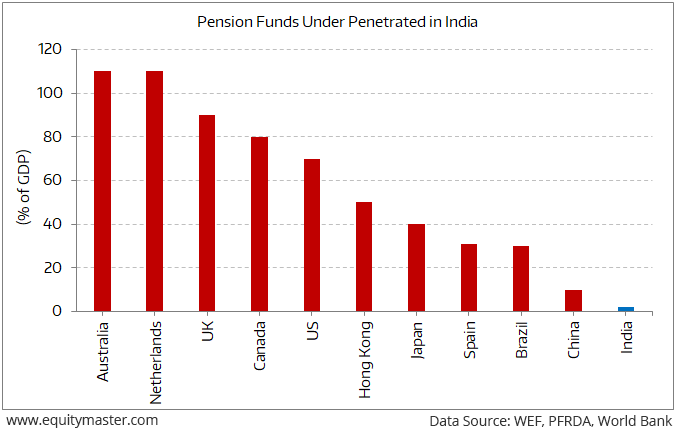Sensex Ends 146 Points Lower; IT And Power Stocks Drag
Indian share markets witnessed selling pressure during closing hours and ended their trading session marginally lower. Sectoral indices ended on a mixed note with realty stocks, metal stocks, and telecom stocks witnessed buying interest while IT stocks and power stocks witnessed selling pressure.
At the closing bell, the BSE Sensex stood lower by 146 points (down 0.4%) and the NSE Nifty closed down by 37 points (down 0.3%). The BSE Mid Cap index ended the day up 0.5% and the BSE Small Cap index ended the day up by 0.3%.
The rupee was trading at 71.46 against the US$.
Asian stock markets finished on a positive note. As of the most recent closing prices, the Hang Seng was down 0.4% and the Shanghai Composite was up by 0.1%. The Nikkei 225 was up 0.1%.
Speaking of Indian share markets, it is interesting to note that more than 40 foreign pension funds (endowments and university and family foundations) registered with the Securities and Exchange Board of India in 2018.
Foreign Pension Funds are Making a Beeline for India

Here's what Tanushree Banerjee, Co-head of Research at Equitymaster, wrote about it on one of the recent editions of The 5 Minute WrapUp...
- According to OECD, the 20 largest pension funds together hold about 43.2% of total global pension assets. Even if India were to receive 5% allocation, it will mean a boom for Indian stock markets.
In last three years, there has been a consolidation as a result of stronger growth among the major players in the pension landscape. And these players are likely to concentrate more on geographies that offer stronger returns apart from relative safety, like India.
However, the fact is that as a percentage of GDP, India's own pension fund assets are miniscule, even compared to that of other developing economies. And this could bring in a huge crisis in the decades ahead.
About a quarter of the projected increase in the global population aged 15-64 years between 2010 and 2040 will occur in India. However, only 7.4% of India's working age population is covered under a pension program. That compares with 31% for Spain and 30% for Brazil, according to the World Economic Forum's report on Global Human Capital.
Therefore, it is imperative that along with attracting global pension funds, India also works towards bringing in most of India's working age population (especially those working in the unorganized segment) under pension plans. Budget 2019 seems to have made a start in that direction.
In the news from the steel sector, Vedanta share price and JSW steel share price were in focus today. Reportedly, the two companies are in talks to make a joint bid for Essar Steel in a last attempt to keep ArcelorMittal away. A bid could be made next week either together, or one from either company.
The bid could be in the range of Rs 450 - 480 billion and would be made on the grounds of value maximization. Arcelor's bid is for Rs 420 billion.
According to sources, even if the bid was put in by either of the companies, it would be jointly funded.
The bid was likely to be made by February 28, by which the National Company Law Tribunal (NCLT) would have to pass orders on the Arcelor resolution plan.
The Essar case has been dragging for more than 570 days now against a stipulated 270 days for resolution. Efforts were being made to wrap up the case after the lead lender, State Bank of India, put its loan exposure on the block.
Essar Steel shareholders, the Ruias, had made a last-minute offer of Rs 540 billion to settle the dues of the company. However, it was rejected by the NCLT.
Vedanta share price and JSW steel share price ended the day up by 3.4% and 1.5%.
Moving on to the news from the aviation space, Jet Airways share price was in focus today on reports that the debt-laden company may consider a rights issue to raise Rs 40 billion if the markets regulator doesn't exempt Etihad Airways from making an open offer in lieu of raising its stake in the carrier.
As part of the resolution plan for Jet Airways, founder Naresh Goyal, Etihad Airways and the lenders to the carrier will subscribe to this rights issue.
Lenders to the domestic airline had prepared a debt resolution plan, which proposed restructuring under provisions laid down by the Reserve Bank of India (RBI), to close a funding gap of Rs 85 billion.
Reportedly, the same has been approved by the airline's board. This will be done through an equity infusion, debt restructuring, sale and leaseback (SLB) and refinancing the aircraft.
Shareholders of the company are scheduled to meet on February 21 for a general meeting to vote on a proposal to increase its authorized share capital from Rs 2 billion to Rs 22 billion through a special resolution.
Jet Airways recently gave its nod to the bailout plan where its lenders, led by State Bank of India (SBI), can convert their loans into equity, thereby making them the airline's largest shareholder.
The report also stated that the decision to turn to rights issues comes after the banks decided to convert their debt into 114 million shares at a consideration of Rs 1 in line with RBI norms.
The airline reported a net loss of Rs 5.9 billion in the December-ended quarter, compared with a Rs 1.7 billion profit in the same quarter last year.
Revenues rose by 1% and stood at Rs 61.5 billion. Operating profit declined by 54% to Rs 4.6 billion.
The Mumbai-based carrier is a facing a severe cash crunch that has put the airline, that employs over 23,000 people, on the verge of a shutdown.



